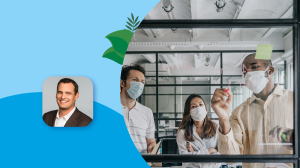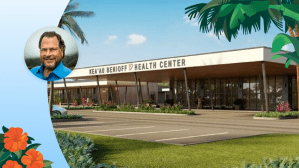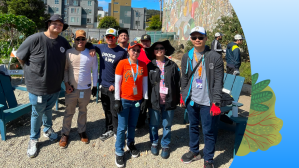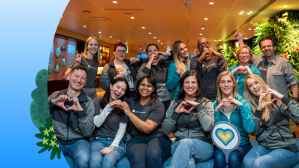Over the last year, the global community was unified by a multitude of crises presented by the pandemic. As the sense of urgency grew with rising food insecurity, economic instability, health inequities, and systemic social injustice, it became clear that not one single sector – business, nonprofit, school or government – could solve for everything alone. The only way through it was, and continues to be, together.
If we learned anything from 2020, it is the power of partnerships. As every aspect of our social fabric was affected, Salesforce.org was proud to be a part of a community of nonprofits, schools and philanthropic organizations working together to tackle the world’s most pressing challenges. We facilitated conversations, convened, and collaborated across multiple industries. As a result, we saw innovation at greater speed, which was only made possible by bringing together diverse opinions, experiences, and expertise. As Marc Benioff so eloquently put it, “crisis brings us to the future faster.”
Connecting global communities to accelerate progress
Finding a solution to the pandemic and its related crises requires global solidarity. It means cooperation and coordination across governments, businesses, and nonprofits to create a unified response to the challenges that we all face.
We are seeing the impact of this kind of global collaboration as one of the many organizations partnering with Gavi, the Vaccine Alliance. Gavi, CEPI, and the World Health Organization are leading COVAX, an initiative aimed at delivering 2 billion COVID vaccines to 190 countries by the end of 2021. As these organizations work together to develop and equitably distribute the vaccine, Salesforce.org is humbled to support this effort with a single, secure portal for all participating countries to share information and data. With purpose-built technology, we can help convene and coordinate different organizations around the world at record pace.
This is how we end the pandemic for everyone.
We create equitable access to resources by enabling multi-sector collaboration
The pandemic exacerbated existing inequalities, placing further burden on communities that are already struggling with a higher instance of chronic disease.
Morehouse School of Medicine (MSM) translated their vision of leading the creation and advancement of health equity into the National Covid-19 Resiliency Network (NCRN). With a grant from the U.S. Department of Health and Human Services, Office of Minority Health, MSM set up a strategic network of national, state, territorial, tribal, and local organizations to deliver COVID-19 related information to communities hardest hit by the pandemic.1
MSM, in collaboration with KPMG, built the NCRN community health portal on Experience Cloud2 and Service Cloud. It equips individuals with tools such as a symptom checker, pharmacy locator, and connections to other community services, which was only made possible by working across businesses, nonprofits, health centers and government agencies. Leaders at MSM also envision it being used to reach populations suffering from other unique health disparities that impact certain underserved populations.
This is an example of how powerful multi-sector partnerships are. Bringing together our individual strengths, expertise, and resources enables us to rethink our approach to problem-solving. In doing so, we can find solutions that directly solve social issues and provide equitable access to support.
Convening powers an open source model to build a better future
As we recover from the last year and look forward to the future, the answers will continue to come from the same place: the community. A collaborative, community-led approach will enable us to develop technology that is more widely available, increasing accessibility and creating a more inclusive society.
Salesforce.org is building on this idea through partnerships like the one with AWS. By combining the features of both platforms, we can help nonprofits and schools protect and manage their data, while increasing the ability to generate and act on insights. It’s through partnerships like these that increase access to technology and lay the foundation for interoperability regardless of platform or organizational limitations.
Beyond technology, building a better future requires an open source approach to collaboration. This requires that we create a space to convene, heal together, share ideas, and reimagine the path forward as one. Salesforce.org is proud to work with leaders across every sector, and to provide the space to bring these organizations together.
Our first ever Nonprofit Summit on April 21st has the potential to be the largest convening of its kind, with over 13,000 people attending from over 130 countries. Imagine the next wave of impact innovation that can come from all of that community strength in one virtual room. We’d love for you to join us. Register today to hear from some incredible speakers like Dr. Jane Goodall, Amal Clooney, and our inspiring nonprofit leaders.
It’s going to take community to restore community, and we have a lot of work to do. The work has never been more challenging and yet more inspiring. Let’s turn our collective ideas into action and accelerate the pace of social change. It could be a new beginning for all of us. See you at the Summit.
1 “National Covid-19 Network Launches New Technology to Build Resilience Against Pandemic Among Racial/Ethnic Minorities,” Morehouse School of Medicine, February 2021
2 Salesforce Experience Cloud was formerly Community Cloud: “Salesforce Announces Digital 360—Transforming Customer Engagement for the All-Digital, Work from Anywhere World,” Salesforce, September 2020


















